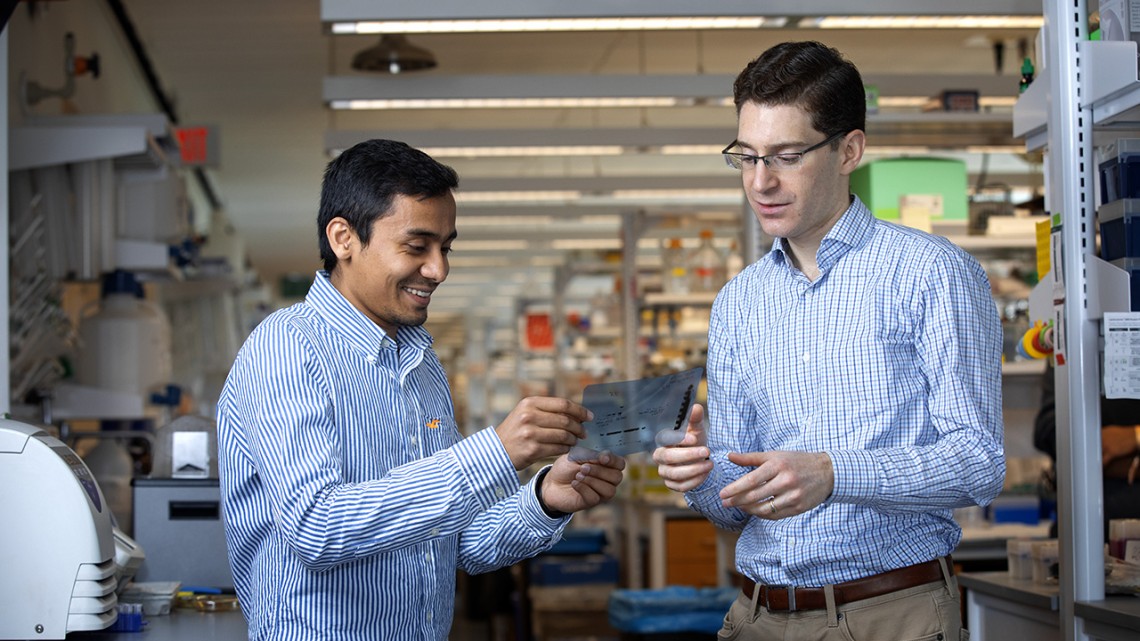
Adnan Shami Shah (left) and Jeremy Baskin in the lab
Baskin wins young investigator award for lipid research
By Krishna Ramanujan
When chemical biologist Jeremy Baskin played piano as a child, his parents noticed something unusual: He loved to improvise.
“I was always noodling around to see what new and interesting things could happen,” said Baskin, an assistant professor and Nancy and Peter Meinig Family Investigator in the Life Sciences in the Department of Chemistry and Chemical Biology and the Weill Institute for Cell and Molecular Biology. “Also, when I was a little kid, so I’m told, I never saw a button I didn’t want to push.”
This precocious curiosity eventually shaped Baskin’s work as a scientist who loves to tinker in the lab to develop new technologies, tools and methods, and apply them to make fundamental new discoveries. In the big picture, Baskin’s research seeks to uncover the roles that lipids – a class of energy-dense organic compounds including fats, oils and waxes – play in the proper function of animal cells and how, when disrupted, lipids can contribute to such diseases as multiple sclerosis and cancer.
Baskin has been recognized for his innovative work with a Walter A. Shaw Young Investigator Awardfrom the American Society for Biochemistry and Molecular Biology (ASBMB). The award was established by ASBMB’s Lipid Research Division and recognizes outstanding research contributions in lipids by assistant professors (or equivalent) with no more than 10 years of experience since receiving a Ph.D. or medical degree.
The award consists of a plaque and cash prize, along with an invitation to present a lecture at the 2020 ASBMB Annual Meeting, April 4-7 in San Diego.
Baskin received his bachelor’s degree from the Massachusetts Institute of Technology in 2004 and completed his doctorate at the University of California, Berkeley, in 2009. He served as a postdoctoral fellow at the Yale School of Medicine from 2010-15, before joining Cornell’s faculty.
Among his many honors, he has received a Sloan Research Fellowship (2019), a National Science Foundation CAREER Award (2018) and a Beckman Young Investigator Award (2017).
In his research, Baskin seeks to uncover how certain lipids can affect the function of biological systems. Specifically, he studies low-abundance lipids that bind to proteins and switch them on and off to initiate cascades that lead to major changes in cell behaviors. The work partly involves developing sensors and chemical strategies for visualizing where and when the cell makes these signaling lipids, and then using those tools to understand the biology.
In a 2016 study, Baskin and colleagues described a new imaging technique for fluorescent imaging of a lipid called phosphatidic acid, which catalyzes cell signaling across a number of pathways and plays a role in disease, including cancer.
In May, Baskin’s lab published a paper led by graduate student Adnan Shami Shah that identified a lipid binding protein, PLEKHA4/kramer, which promotes a vital signaling pathway in all animals with cells that differentiate into tissues. This pathway, called the Wnt signaling pathway, is necessary for the development of cells and embryos, for cell differentiation, and it is disrupted in cancers and in multiple sclerosis. For this reason, the Wnt pathway is a major drug target, and PLEKHA4/kramer opens new avenues for investigation.
“The invention of new tools that are rooted in chemistry allows us to approach systems in ways that really weren’t possible before, and we can go back and address questions that weren’t addressable before,” Baskin said.
Media Contact
Get Cornell news delivered right to your inbox.
Subscribe
